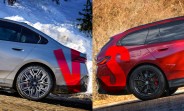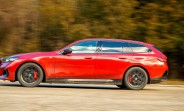BMW unveils new eDrive system with longer range, faster charging
BMW claims it has made huge progress in electric car tech with its sixth-generation eDrive system. This new system, which will be featured in the upcoming Neue Klasse electric vehicles, promises to boost range and charging speed, and improve overall efficiency.
One of the key improvements is the new battery. BMW has redesigned its battery cells, packing 20% more energy into the same space. Combine this with the new 800V technology, and you're looking at 30% faster charging times and a 30% increase in range. Some models might even exceed these numbers. The batteries will also be capable of bidirectional charging. These changes are important because they address two major concerns people have about electric cars: how far they can go on a charge and how long it takes to recharge.

The battery's performance is managed by the BMW Energy Master, a control unit developed and built by BMW at their Landshut plant. This unit controls the power flow to the motor and other systems, and it works with both high- and low-voltage power supplies. By developing both the hardware and software themselves, BMW has complete control, allowing them to make real-time updates and improvements via remote software upgrades.
BMW is also taking a different approach to electric motor design. While they're sticking with their electrically excited synchronous motor (EESM) design for its efficiency and power, they're also adding asynchronous motors (ASM) to the Neue Klasse lineup. ASM motors are smaller and less expensive. This "technology-open" strategy lets BMW customize its electric powertrains for different vehicles, offering models with one, two, three, or even four electric motors. The EESM has also been upgraded for the Gen6 system, redesigned for the 800V system, and improved with better cooling and lighter weight. The company has reduced energy losses by 40%, costs by 20%, and weight by 10% compared to their previous generation xDrive model.

These high-tech parts are being produced in a smart way. Battery assembly plants are being built near vehicle factories in several countries, including Hungary, China, Mexico, and the United States. This "local for local" strategy helps ensure production and simplifies logistics. Battery cell production agreements have also been made with partners across Europe, China, and the US. The Energy Master control unit will be made at BMW's Landshut plant, supplying all the global battery assembly sites. The electric motors will be made at BMW's Steyr plant in Austria, which has a long history of making powertrains.
BMW is also tackling the important issue of battery recycling. They've partnered with SK-TES to recover valuable materials like cobalt, nickel, and lithium from old batteries and reuse them. They're also working on new direct recycling methods to reuse materials from both battery production and old batteries.
Reader comments
- Kidney Beans
- kmq
Call it new, but in German. Change the grill. Und make lots of nags with those talking and beeping and lights and blinking colours.





Facebook
Twitter
Instagram
RSS
Settings
Log in I forgot my password Sign up